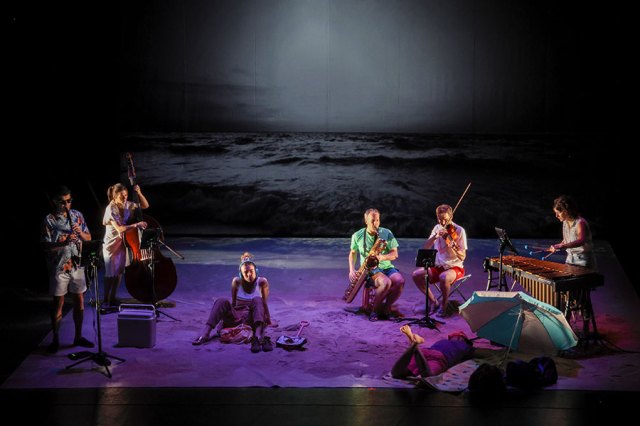All Right. Good Night. at Manchester International Festival – review
The story is based on the disappearance of the Boeing 777 in 2014

Every day, a Chinese family goes to the Malaysian embassy in Beijing and asks: “Is there any news?” The news they doggedly, desperately, seek is what happened to the Boeing 777, and their loved ones who were on it, that suddenly vanished somewhere over the Pacific Ocean in 2014.
Rimini Protokoll’s show – flown over from Germany – is the product of director Helgard Haug’s obsession with that MH370 mystery. But its interest and impact isn’t as an objective, investigative post-mortem, but how it interleaves another family’s loss on the ground. Shortly after the disappearance, Haug’s father began to freefall into dementia.
A thin gauze at the front of the stage casts everything in a haze and fuzz. There’s also an aural fracture and dislocation – from the starting jumbled sounds of the orchestra tuning their instruments, to the disembodied voices that echo the projected text. The instruments’ different sounds lap over each other and reverberate in Barbara Morgenstern’s ambient soundscape that atmospherically reflects the suspension of a cruising plane and the wooziness of fading memory.
The production is particularly skilful at creating jarring effects. Everything halts into silence and darkness at the moment the plane disappears and the father’s agency collapses. Afterwards, harsh intervals of blinding white light chart the progression of each passing year.
Equally impressive is how it captures the obsessive dredging and searching. One sequence sees words and phrases scud across the screen like planes on a radar. In another, percussion taps out into a sonar pattern. The sequences repeat in structure like the search efforts: constantly built up, reset and then started all over again. Performers move in reverse like the drift analysis that retraces plane fragments.
Although there are often pleasingly clear and natural symmetries between the MH370 and father narratives, some feel a little crude and contrived. The father calling himself “a wreck” while plane debris lands on the stage. Or the dementia patient reduced to monosyllabic mutterings, alongside the pings that travelling aircraft exchange with satellites as a ‘handshake’.
At its best, the father’s decline is a poetic backdrop that brings the international sweep down to a smaller, personal scale. Sometimes, however, it feels too secondary, eclipsed by the grander mystery of the plane.
The continuous stream of projected text can be hard to follow as it flows continuously between the two stories without markers and delineation. Across more than two hours, the storytelling is padded with conspiracy theories and endless failed search attempts that develop a bagginess as it pulls us further from the story’s epicentre.
It nevertheless feels neither exploitative nor sensationalistic. It’s a virtuosic, deeply moving production where micro and macro stories of loss and contact criss-cross like passing planes.














